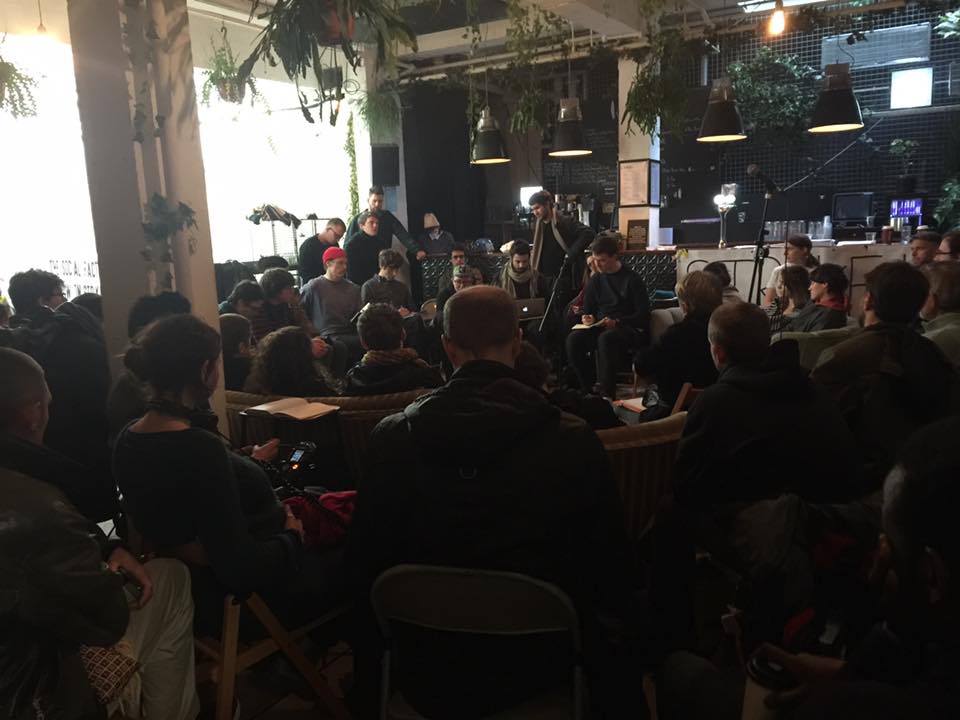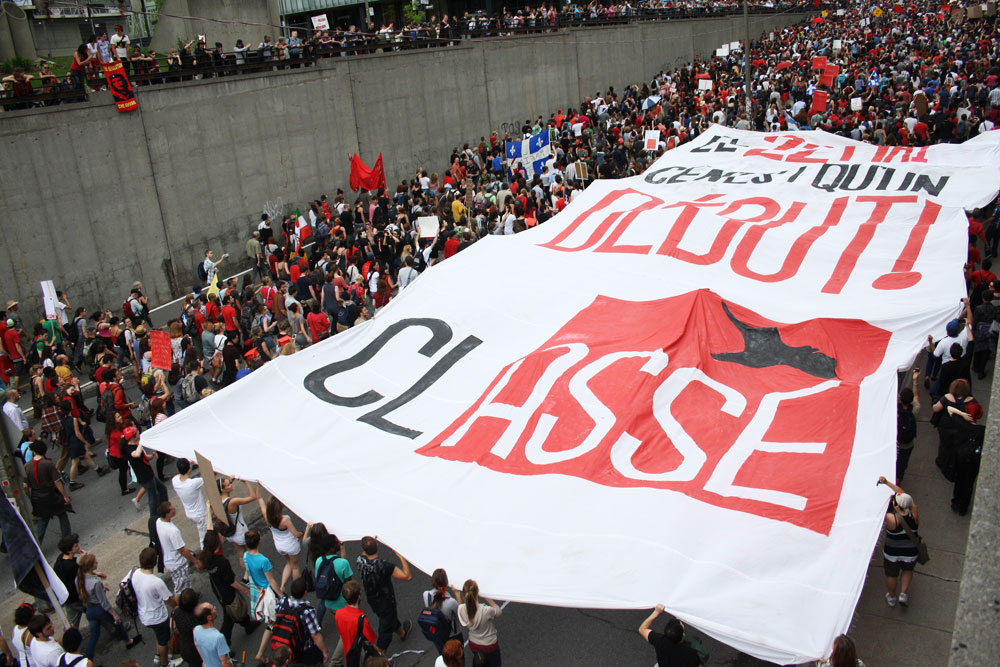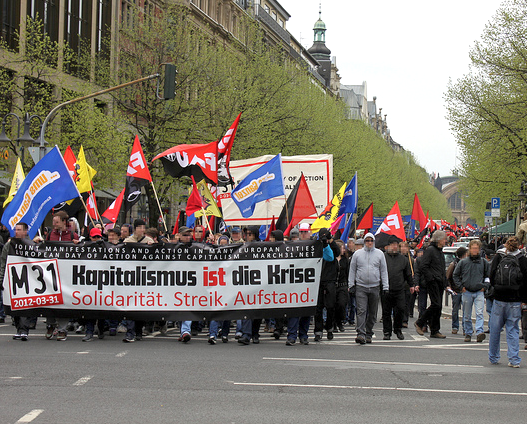On February 10-12th Plan C hosted the third Transnational Social Strike Assembly in London. It brought together 160 people from 40 organisations and 9 countries to discuss, organise and plan around questions on the social strike. We’re pleased to be able to share recordings of all but one of the workshops that took place on the Saturday of the assembly, covering issues ranging from the collapse of the political centre, to women’ strikes, logistics strikes and social reproduction strikes.
Welcome to Brexit Europe: The End of the Holding Pattern
Presentations by: Keir Milburn (Plan C, UK) and Gabriella Alberti (One Day Without Us, UK)
The neoliberal economic settlement, which had been in place for thirty years, was broken by the financial crisis of 2008. The continuing inability of the global economy to get out of stagnation is testament to that. Yet for eight years little seemed to change politically. Politics seemed stuck in a holding pattern, unable to address the crisis yet also unable to renew itself. 2016 saw the end of that holding pattern. The extreme Center has collapsed but so far it has predominantly been replaced by the extreme Right. Brexit, Trump, Erdogan, Termer, Le Pen. Theirs is the dominant story of 2016. But there are other stories, sidelined for now, which might still be rescued by a future turn of events. The biggest ever workplace strike in India last September, with over 100 million strikers, has been mirrored by an emerging trend towards ‘political’ or social strikes in the ‘developed world’. Now, within the first week of Trump’s presidency, an explosive social movement is emerging in the US with strong indications of its echo in the UK. We ask how Brexit, Trump, and the Far Right turn should affect our strategies. How can we fight the Right while retaining the ability to pick our own terrains of struggle? How can we strengthen the strikes movements to fight against both right and left neo-liberalism?
[mixcloud https://www.mixcloud.com/PlanCLondon/welcome-to-brexit-europe-the-end-of-the-holding-pattern/ width=100% height=120 hide_cover=1 light=1]
Striking Across the Wage
Presentations by: Vanessa Bilancetti (ESC- Rome), Julia Lindblom (Allt åt alla, Stockholm), Ben Beach (Rent Strike Network, UK) and Seth Wheeler (Plan C London)
The ‘social strike’ can be understood as the adoption of tactics traditionally associated with labour disputes (the ‘walk-out’ and the ‘withdrawal of labour’) into the activity of political projects outside of the traditional workplace and its securities; as recently demonstrated by the call for ‘everyone to stop work’ (both in the workplace and in the home) during the mobilisation in defence of ‘reproductive rights’ in Poland and during the social strike in Italy of 2014, where a coalition of organisations struck in demand of wages, the right to remain and welfare.
In this way, a social strike could be argued to be an exercise by labour in constituting ‘political’ power in order to effect pressure on state legislature in much the same way as a workplace strike puts pressure on a boss or a rent strike puts pressure on a landlord.
The social strike is different to other forms of ‘mass protest’; primarily social strike is predicated on the recognition of the role of labour within the process of capitalist valorization (whether waged or unwaged) and seeks to exert leverage through its withdrawal. A social strike is effective when we converge as different workers, precarious, women, migrants to struggle together turning their difference into a source of power.
Within the schematics of traditional labour struggle, the success or failure of a strike is contingent on the ability of those within a dispute to build for mass participation and then ‘socially reproduce’ themselves over a protracted period. A strike will last as long as either a ‘work force can survive without wages’ or ‘management can survive without profits’. In this model a strike is understood to be a race, pivoting on the capacity of either party to ‘hold out’ over the necessary distance for victory. How then have social struggles external of either traditional sites of production or outside of official union structures constitute themselves in order to win?
[mixcloud https://www.mixcloud.com/PlanCLondon/social-strike-striking-across-the-wage/ width=100% height=120 hide_cover=1 light=1]
Towards the Global Women’s Strike
Presentations by: Black Protest/International Women’s Strike (Poland), Infosex- Esc Atelier (Rome, Italy), Strike4Repeal (Ireland), Precarious (dis)Connections (Bologna, Italy), Student organisation Iskra (Slovenia) & Allt åt alla (Sweden)
After the mobilization and women’s strikes occurred last year, after the huge women’s turnout during the inauguration day, in the US and beyond, in many countries all around the world public meetings and assemblies are taking place to turn the celebrations on the 8th March into a massive women’s strike.
The women’s strike is the confirmation that the strike can be brandished by millions of women as a feminist practice of insubordination, beyond the unions and its institutionalized form, and can be a truly transnational matter. Following the call of the Argentinian women to «organize ourselves» transnationally, the workshop intends first to discuss how to build stronger connections across the borders towards the 8th of March and beyond, by exchanging experiences of organization.
Second it is meant as an open discussion on the novelty and the stake o f the women’s movement: how do we see the link between the fight against oppression – male violence over women, discrimination, for the freedom of abortion – and that against precarity and exploitation in production and reproduction and the sexual division of labor acting on a transnational scale? How is it possible to act in order to make the strike able to hit production and reproduction, while showing women’s unavailability to respond to the role neoliberal patriarchy assigns to them? How to address unions and social movements in order for them to line-up on the side of women?
[mixcloud https://www.mixcloud.com/PlanCLondon/march-8th-towards-the-global-womens-strike/ width=100% height=120 hide_cover=1 light=1]
Logistics Strike
Presentations and participation from: Precarious (dis)Connections (Bologna, Italy), Plan C (UK), IWGB – Couriers Branch/Deliveroo Workers (Brighton, UK), IWW Union (Bristol, UK), SI COBAS Union (Italy)
After the spontaneous struggles that exploded in Deliveroo and UberEats in London over the summer, lots of attention has been paid to conflict in the ‘gig economy’.
The ‘gig economy’ in the UK is relatively small employing about 3% of the workforce, but it could potentially have importance beyond its size. Moreover, the ‘gig economy’ is becoming a site of tensions and struggles across borders. ‘Algorithmic management’, the use of big data to predict demand and allocate resources using automated systems and processes, reveals new forms of organisation of labour that manage exploitation and are likely to spread. Over the next few years it will increasingly reorganize the labor process that creates and imposes on to low wage, migrant and precarious sectors of the workforce.
As a result, there is a chance for lessons to be learnt in struggles against companies like Deliveroo, Foodora and Amazon that can be circulated on a transnational level.
One the one hand, if we continue to learn how to take ‘unorganisable’ working conditions and turn them into a source of power, we could generate the basis for much larger struggles. On the other hand, we need to increase our common understanding of the role that the ‘gig economy’ plays in the wider logistical reorganization of production. As TSS we recognise logistics as a critical site of struggle for a strike that wants to be social and transnational. We also recognised and discussed in previous meetings the diversity of conditions inside logistics.
[mixcloud https://www.mixcloud.com/PlanCLondon/logistics-strike/ width=100% height=120 hide_cover=1 light=1]
One Day Without Us
Presentations by: Valery Alzaga (Justice for Janitors Organiser, US), Coordinamento Migranti (Bologna, Italy), No one is illegal (Germany)
How can we combat the growing anti-migrant turn that has accelerated since the BREXIT vote? With the ‘One day without us’ day of action coming up on February 20th, a day that has taken inspiration from the same slogan which was raised on May 1st 2006 across the US, when many hundreds of thousands of migrants and supporters took to the streets, to demand their rights to remain. In 2010 the call for a migrant strike was made in France, and taken up by grassroots and self-organised migrant collectives across Italy on March 1st of that year. These experiences of ‘migrant strikes’ put the demands and desires of migrants at the forefront of struggles. When we talk of migration it is not only about the celebration of ethnic and cultural diversity, it is about how migrant labour is exploited, managed, supplied and controlled. How the border regime is not just places at the crossroads between countries but how borders and the management of privileges, the racialised hierarchies and wage disparities, access to welfare and healthcare – become the internal borders across society.
With the call of 1 Day Without Us, we highlight the dependency that economies have on migrant labour, the exploitation that conditions it and the alliance and social bonds that are formed in not only being migrant but becoming migrant, an increasingly expanding norm of precarious and zero contracts and high occupancy living, of becoming precarious. Recently, since President Trump’s move to ban muslims from entering the US from seven muslim majority nations, a new movement is developing in reaction towards his decrees. Taxi drivers went on strike, migrant owned businesses closed down in protest, and here in the UK new alliances with 1 Day Without Us and the Stop Trump Coalition is calling on walkouts and mass demonstrations on February 20th – a day that coincides with the debates on parliament brought on by almost 2 million signatures asking for Trump’s state visit to be cancelled.
In this final session we will hear from experiences of the migrant strike movements in the US, Italy, France and UK – and learn how these movements developed and the wider forms of social solidarity that brought migrants and non-migrants closer and the challenges they faced. We will also hear on plans for February 20th and any practical attempts to amplify the call for the day.
[mixcloud https://www.mixcloud.com/PlanCLondon/1-day-without-us-final-plenary/ width=100% height=120 hide_cover=1 light=1]



